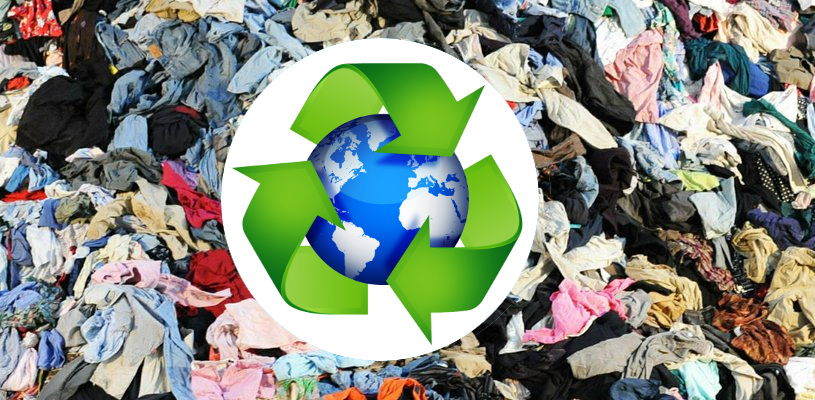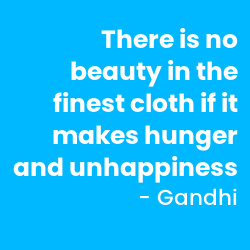
What is slow fashion?
Slow fashion is the opposite to fast fashion, a business model designed to rapidly mass produce inexpensive clothing for large retailers. Slow fashion is a movement that advocates for environmentally considerate buying and manufacturing of clothes, promoting principles such as good quality, recycling, upcycling and fairness for producers of garments.
The slow fashion model has been growing for the last 10 years and is now really taking off! We’re going to look at why slow fashion and sustainable clothing is important, the shift in our culture and thought process and ultimately, what this means for the promotional apparel industry.
Why is sustainable clothing important?
You don’t have to do much research to find out why sustainable fashion is so important. Here are a few harrowing statistics:
- 700 gallons of water are needed to produce a cotton t-shirt. In fact, 2.6% of global water is used for growing cotton.
- 99% of clothes can be recycled, yet 85% are sent to landfills.
- It’s the 2nd most polluting industry, attributing to 10% of global carbon emissions.
- It’s the most labour dependant industry in the world. In Bangladesh alone there are an estimated 4 million workers in 5,000 factories who earn as little as $3 a day.
These statistics are collected from a number of sources including The Huffington Post , Wikipedia and EdgeExpo.
 1 in 6 people are said to work in the global fashion industry, an industry estimated to be worth 2.5 trillion dollars a year. However, a large percentage of this workforce receives a very small percentage of the mass profits this industry generates. Terms like “sweat shops” are commonly used to describe the poor working conditions and disasters such as the 2013 Rana Plaza Collapse, which resulted in the death of over 1,100 workers, is all too common.
1 in 6 people are said to work in the global fashion industry, an industry estimated to be worth 2.5 trillion dollars a year. However, a large percentage of this workforce receives a very small percentage of the mass profits this industry generates. Terms like “sweat shops” are commonly used to describe the poor working conditions and disasters such as the 2013 Rana Plaza Collapse, which resulted in the death of over 1,100 workers, is all too common.
In fact, this year, pop group The Spice Girls and their apparel production company have come under fire when it emerged that their “charitable” t-shirts were being made by workers in Bangladesh earning just 35p an hour in awful conditions. The irony being that the Spice Girls were donating a large proportion of the profits from the sale of these t-shirts to charities promoting women’s rights.
However, the news coverage that these tragic stories are getting seems to be having an impact. People become outraged and stories are shared and commented on in social media and you feel a shift is beginning to take place in the minds of people and of companies.
A change is coming
The last ten years has seen a big increase in sales of sustainable clothing with more niche retailers emerging with a focus on recycled clothing, Eco fabrics and sustainable production. There has also been a change in people’s mindset with second hand clothing being seen as vintage and a lot more people willing to spend more money on quality clothing items that will last. Innovative businesses like Hire the Catwalk and Front Row, which rent out high end used fashion garments, are also focusing more on quality recycled clothing.

This change in cultural consciousness has meant that major retailers have had to stand up and take notice. Brands such as Zara and M&S now have collection points for unwanted clothing with some offering incentives for donating. In 2016, high street giant H&M released a public commitment statement promising to be 100% circular by 2030, meaning their clothes with be solely produced from recycled or sustainably sourced materials. These massive moves indicate that a change is coming. A recent article in the Guardian stated that 44% of young millennials (aged 17-24) would like to see more sustainable fabrics used in clothes. This was more than any other generation asked and might indicate that this ECO shift is coming just at the right time and that the slow fashion movement will only get stronger.
What does slow fashion mean for the promotional marketing industry?
The term “slow fashion” would not typically fill a producer of promotional t-shirts with joy despite the positive effects it may have on the environment, however there is a big opportunity to be had here. One of the core principles of slow fashion seems to be buying less but buying quality. In fact, that has been a trend we have seen generally with promotional product purchasing over the past 24 months.
During a poll taken at Marketing Week Live, the BPMA (British Promotional Merchandise Association) discovered that a whopping 91% of attendees use branded clothing in their business and interestingly, they stated the most important factor when choosing their promotional garments is quality.
There are lots of great manufacturers of ECO garments to be found and with the clients willingness to spend a few extra pennies, these ECO t-shirts and jumpers will make great promotional giveaways or items of staff uniforms. In our opinion these are the items that companies will want to buy and distributors should be promoting for both financial and ethical reasons. We’ve found ECO clothing to be the fastest growing area of promotional apparel and with the Slow Fashion movement coming into full force, this will only grow further.
Brandelity offers a wide range or promotional printed and embroidered apparel, all from traceable sources. Our ECO and organic clothing section shows just a small portion of the sustainable apparel we can brand for you. Please contact us for more options or with any questions.
Share This Page
Narelle McGregor
Marketing Manager at Brandelity. Passionate lead generator, content creator and digital marketer with more than 12 years experience. Works hard daily to promote sustainable branded merchandise and highlight the impact of eco-friendly promotional products.


